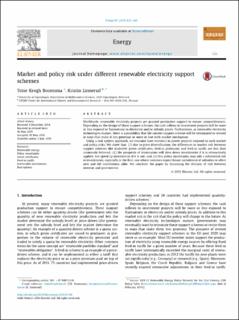Market and policy risk under different renewable electricity support schemes
Peer reviewed, Journal article
Published version
Permanent lenke
https://hdl.handle.net/11250/2740501Utgivelsesdato
2015Metadata
Vis full innførselSamlinger
- Journal articles [478]
Sammendrag
Worldwide, renewable electricity projects are granted production support to ensure competitiveness. Depending on the design of these support schemes, the cash inflows to investment projects will be more or less exposed to fluctuations in electricity and/or subsidy prices. Furthermore, as renewable electricity technologies mature, there is a possibility that the current support scheme will be terminated or revised in ways that make it less generous or more in line with market mechanism. Using a real options approach, we examine how investors in power projects respond to such market and policy risks. We show that: (1) due to price diversification, the differences in market risk between support schemes like tradeable green certificates, feed-in premiums and feed-in tariffs are less than commonly believed; (2) the prospects of termination will slow down investments if it is retroactively applied, but speed up investments if it is not; and, (3) this policy uncertainty may add a substantial risk to investments, especially in the first case where investors expect future curtailment of subsidies to affect new and old installations alike. We conclude the paper by discussing the division of risk between investor and government. Grønne sertifikater eller feed-in tariffer--en artikkel om risiko
